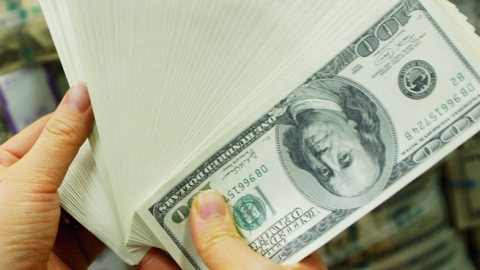The U.S. economy added 248,000 jobs in September, and the unemployment rate dropped to 5.9 percent. But the labor force participation rate continued to fall, average hourly earnings seem frozen, and over 13 percent of workers are either out of work, involuntarily working part time or too discouraged to keep hunting for jobs, and 20 percent of teenagers are out of work. In short, two cheers for the latest report, but hold the champagne.
Sales of new homes rose 18 percent in August from July, but sales of previously owned homes, 90 percent of all sales, fell 1.8 percent, and house prices softened. Car sales are motoring along as consumers replace a fleet that is 11 years old on average, but last month's 9 percent sales growth rate would be difficult to maintain. Manufacturing "remains at a solid absolute level," according to Goldman Sachs' economists, but its growth has slowed and it is weaker than many analysts expected. In short, the usual mixed bag.
Warren Buffett describes our economy as "inching along." Not so the global economy, which he says is "clearly slowing." Look south, and we see a Venezuelan economy so badly managed that there is a flight from its currency - a Big Mac can be had by anyone who can afford $33. Argentina is in default and in contempt of court, its inflation rate is 40 percent, its economy shrinking despite a soaring stock market in which only high-risk-takers such as George Soros and Daniel Loeb dare play. Mexico is sending us its huddled masses yearning to breath free of drug lords.
Look East and the European Union suffers a recovery that is "weak, fragile, uneven," according to Mario Draghi, president of the European Central Bank. The EU economy is on the brink of deflation, its banks have yet to get their balance sheets in shape. And its bureaucrats seem unable to concoct a policy that persuades Germany's iron chancellor Angela Merkel to relax the austerity policy that Italy and France believe are stifling their (unreformed) economies. Merkel would prefer that they institute structural reforms in their labor markets, and pare government spending that now accounts for more than 50 percent of France's GDP. Germany's ability to sell 10-year bonds at an interest rate of under 1 percent is testimonial to the success of her policy -- although not proof of its wider applicability. Further east, Vladimir Putin longs to reveal NATO to be a paper tiger by grabbing a piece of some Baltic member, unopposed.
Look West and there is Japan, its economy near death after being shot with one of Prime Minister Abe's famous policy "arrows," a massive increase in VAT. And North Korea, rattling its nukes and peddling its bomb-making and long-range missile technology while its population starves. Most of all there is China. Its economy is experiencing "widespread softness" according to Yingying Xu, economist at trade group MAPI, its banks still hold too much dicey paper from state-owned enterprises, and its property sector is coping with a huge over-supply of apartments and houses. Adding to uncertainty are pro-democracy protests in Hong Kong, a major business base and home to what by some measures is the world's fifth largest financial center, and a regulatory crack-down on foreign firms. And adding to certainty-of the unsettling sort-is China's response to Obama's rhetorical "pivot" to Asia: further roiling of the waters of the South China Sea by expanding the reach of its navy, and threatening us and our allies.
In Africa, traditional turmoil is now augmented by an Ebola outbreak. The arrival in Dallas of an infected Liberian is scary. But no worry, said government doctors from the once-revered Center for Disease Control (CDC) - until they discovered that when the infected Liberian reported to a hospital with symptoms, he was told to go home despite having informed nurses he was from Liberia. Have no fear. "Rest assured that our system is working as it should," Texas governor and candidate for the Republican presidential nomination Rick Perry told concerned Texans. Oh.
Some 100 people, including airline passengers and children at five schools, have had direct or indirect contact with the infected patient and are now being tracked down and monitored.
The CDC is not the only once-sacred American institution that is losing the confidence of the American people:
* The Secret Service, a legendary protector of the president, featuring world-familiar dark suits, ear phones and sun glasses rain or shine, failed to prevent knife-wielding Omar Gonzalez from scaling a fence and roaming the White House; a thrice-convicted, gun-toting felon, was allowed to enter an elevator with the president; and the service failed to notice bullet holes in a White House window until they were reported by a housekeeper.
* The Internal Revenue Service, once notably non-partisan, used its vast powers to cripple the ability of conservative groups to raise tax-exempt funds.
* The Department of Homeland Security, without warning the local communities, distributed around the country thousands of children who had entered the country illegally.
* A disgruntled, converted Muslim beheaded a co-worker while shouting Islamist slogans, and
* The intelligence services failed to notice the rise of ISIS, permitting it to gather strength, says no less an insider than the president.
It seems the world is too much with us, while here at home we are unable to manage our own affairs very well. Which probably explains why consumer confidence took a dive in September to the lowest level since May. Pulitzer Prize winning columnist Charles Krauthammer captures the national mood when he says there is "a sense that things are out of control."
That mood is expected to play itself out in 30 days, when Republicans are expected to do well in the mid-term elections. That expectation has corporate executives planning for a less hostile government. Expecting interest rates to rise, they are borrowing now to prepare for stepped-up spending. Global corporate bond issuance this year has already topped $1 trillion and is headed for a record. American companies have borrowed some $40 billion to finance capital spending, a 90 percent jump over last year according to Dealogic. It's borrow now before interest rates rise.
Wrong, say traders who have kept share prices within shouting distance of all-time records. They reason that Federal Reserve Board chairwoman Janet Yellen will not allow a significant increase in rates until she sees a major decline in the number of job-market drop-outs, a durable upward trend in wages, and other signs that slack in the labor market is disappearing. It will take more than an unemployment rate below 6 percent and headed toward the Fed's non-inflationary rate of 5.5 percent to persuade Yellen to turn from dove to inflation hawk. With inflation low and the dollar strong, she does not fear an inflationary burst and so will keep interest rates low enough long enough to make owning shares a good bet. Especially since two of the more hawkish members of the policy committee, Charles Plosser and Richard Fisher, presidents of the Philadelphia and Dallas Federal Reserve Banks, respectively, will be retiring next year.
If corporate borrowers do use the proceeds of their bond sales to invest in plant and equipment, the pace of the recovery just might increase enough to allow Yellen to raise rates. Despite any such increase, profits might rise enough to justify the share prices traders now believe depend on low interest rates, making them right to hold shares, although for the wrong reason. Being right for the wrong reason is less intellectually satisfying but just as profitable as being right for the right reason.














